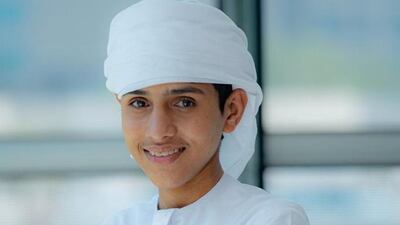After a six-hour surgery to remove a life-threatening abdominal tumour, teenager Mubarak Alemenhali is looking forward to being able playing football with his friends for the first time in years.
The 15-year-old Yemeni, who lives in Abu Dhabi, suffered a rare disorder affecting just two in every million people.
His paraganglioma, a rare tumour that attacks the peripheral nervous system, left him with high blood pressure, uncontrollable emotional outbursts, headaches and stomach pain.
The complex surgery was completed, in Abu Dhabi this summer, to set Mubarak on the road to recovery and return to normal childhood.
“I was told by so many hospitals that my surgery was not possible,” he said.
“But at Cleveland Clinic Abu Dhabi, they took care of me and took my pain away.
“I am excited to go to school and play with my friends and hang out after classes. I feel like my health is improving every day."
He said his friends were looking forward to seeing him too.
“I share my progress with them on WhatsApp and hope to join them soon.”
The eight-centimetre tumour had affected the part of his body that controls bodily functions like blood pressure, heart rate and intestinal movements.
The slow-growing tumour usually affects people between the ages of 30 and 50 and can be non-hereditary.
Several hospitals in the UAE said they were unable to treat his condition due to the closeness of the growth to the aorta - a vital vessel that carries blood away from the heart and around the body.
It was considered too risky an operation.
Heart specialists were called in from Cleveland Clinic Abu Dhabi to try and remove the tumour that, if left, could have been terminal.
“Mubarak had already been to several hospitals but because of the complexity of the tumour they were unable to find the right treatment that would alleviate his symptoms and save his life,” said Dr Yasir Akmal, a consultant surgical oncologist in the hospital’s Digestive Disease Institute.
“The tumour had risen from the nerve cells around the body or the adrenal glands and tended to secrete hormones like adrenaline.
“This causes the fight or flight response, anger, high blood pressure and stress.
“Since these are uncontrolled bursts of adrenaline, it can lead to a stroke and heart attacks if untreated.”
The growth had also blocked off the main blood vessels coming from the aorta, which supplied the liver and small intestine.
At the same time, the patient’s body compensated by forming large collateral blood vessels and different routes to supply blood to these organs.
Had his body not adapted in this way, his liver and intestine would have failed.
“The connection that we had created for his liver was working well but he had lost blood flow to the gall bladder,” said Dr Akmal.
“We had to remove that and a small part of his pancreas. He was given antibiotics and supportive care to assist his recovery.
“Such an extensive tumour is very rare, even in adults, and this was one of the most complex resections that we have done.”
Further details about the case, including when Mubarak had the tumour diagnosed where not made available.


